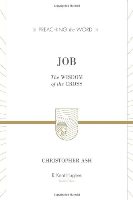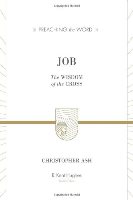Christopher Ash works for the Proclamation Trust in London as director of the Cornhill Training Course and serves on the council of Tyndale House in Cambridge. In 2006 he published his first work on Job, entitled Out of the Storm: Grappling with God in the Book of Job, and you may have noticed our recent blog about his new sermon-commentary, Job: The Wisdom of the Cross, the latest addition to Crossway’s Preaching the Word series. Christopher Ash is here today to talk to us about his newest work.
Books at a Glance (Fred Zaspel):
Tell us something of what lies behind this book – Job has clearly been a subject of long-standing interest. Have you preached through the book more than once? And how is this book different from your earlier books on Job?
Ash:
When I was a local church pastor I thought I would have a go at preaching a series from Job. I was inspired by Bob Fyall’s little book How does God treat his friends? (and what a striking title!) and motivated by the obvious relevance of the book to the pastoral realities of people’s lives. This developed into a short introductory book, Out of the Storm and began a lifelong interest. Since then I have preached series on Job at various conferences and churches. In addition I have preached and taught about Job to the Proclamation Trust’s Cornhill Training Course for a number of years. When Kent Hughes kindly invited me to fill a gap in his Preaching the Word series, I was unsure whether or not to agree. In the end I felt that Job is of such ongoing importance to us all that I would have a go. The new book is a much more thorough and comprehensive attempt to take the reader right through every speech in Job and to grapple with the issues more deeply.
Books at a Glance:
Explain what you have in mind when you state that the book of Job raises the question, What kind of church should we want?
Ash:
It seems to me that the most pervasive and dangerous distortions of the gospel worldwide are the prosperity gospel and what I call the therapeutic gospel. The prosperity gospel in its most crass form claims that if you or I follow Jesus, then Jesus promises to give us wealth and health. But what happens to this kind of so-called gospel if we already have wealth and health as, by and large, we do in rich countries? Of course there are people richer than us, but we have enough food and clean water, which makes us rich by world standards. And many of us have much more. And of course we are not always healthy; but our health care is pretty good and our diet and stable societies mean our life-expectancies are at historically very high levels. What happens is that the prosperity gospel metamorphoses into the therapeutic gospel. This says that not only does Jesus promise me objective good things (health and wealth); he also promises me subjective good things (feeling good about myself, self-esteem, peace of heart, and so on). The book of Job pulls the rug out from under both these distortions. This bible book is, I suggest, a very important one for the contemporary church worldwide.
 Books at a Glance:
Books at a Glance:
It is likely that many will be curious about the subtitle of your book and perhaps find it a bit surprising – The Wisdom of the Cross. How is the book of Job a book about the cross of Christ?
Ash:
That is a very good question. People sometimes suggest that the book of Job is about suffering in general, and that Job represents “Everyman”, human beings in general. But it seems to me that Job cannot be “everyman” for several reasons. He is exceptionally righteous (1:1,8; 2:3), exceedingly great and successful (1:3), and his sufferings are intensely deep (1:6-2:10). He is better and greater by far than us, and his sufferings far exceed ours. Far from being a picture of human suffering in general, the book tells the story of a unique man suffering with unmatched intensity.
In the big sweep of the bible story it is very natural therefore to see him as foreshadowing Jesus Christ, the one absolutely righteous man on earth, the greatest human being who has lived, and the one whose sufferings were uniquely deep and grievous. Job in his extremity helps us understand Jesus in his uniqueness.
Books at a Glance:
Explain the difference between what you call armchair questions and wheelchair questions.
Ash:
I hope no one in a wheelchair will be offended by this way of speaking. Here is what I mean. We can discuss suffering, sin, blessing, troubles, and so on as it were from a comfortable armchair; this has the feel of a university seminar or a discussion among students, in which people who are not suffering discuss suffering. Or we can discuss suffering from the position of those experiencing suffering; this is what I mean by calling them – loosely – wheelchair questions. When I ask these questions from a wheelchair (literally or metaphorically) I identify deeply with the suffering; there is no danger I will make light of it.
Books at a Glance:
What should we think of Job’s friends? And what can we learn from them?
Ash:
Ah, yes, this is a tricky one. After all, God says these three friends have not “spoken rightly” about God (42:7) and so we would need support from elsewhere in scripture before being confident that any particular thing they say is true. And yet these speeches are part of scripture and ought to benefit us and promote faith in Christ (2 Tim.3:15-17). It is hard to give a short answer and really you need to read my book, in which we walk carefully through each speech! The comforters say many true things – true things about God, true things about justice, true things about sin and judgment. But they are not true of Job.
The critical thing they deny is the possibility of unjust suffering, and therefore the flip-side of this, which is the possibility of undeserved blessing, or grace. I have included an introductory chapter about the comforters’ theology, and in the various speeches have suggested what we can learn from them. One of the main things I have learned is to be warned, because it is so easy for our Christian culture to slip into a Job’s comforters culture, and for grace to slip out of the window.
Note: Click here to see part two of our interview with Christopher Ash.

